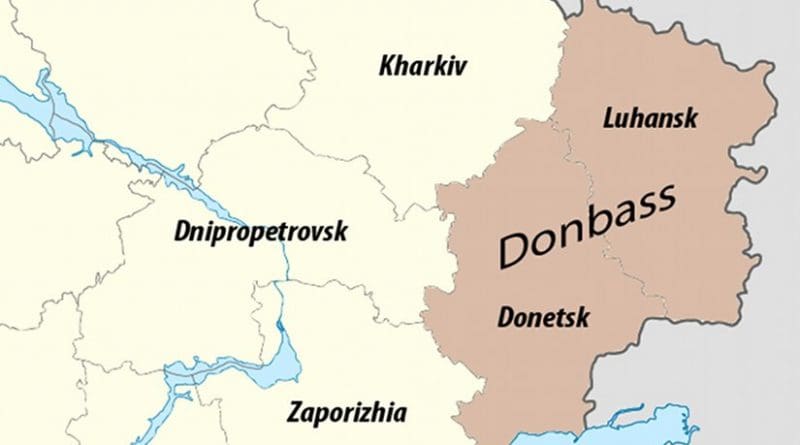‘Croatian Scenario’ Shortcomings For Ending The Donbass Conflict – Analysis
The so called “Croatian scenario“, is something that has been periodically brought up after the start of the armed conflict in Donbass. (Among other instances, yours truly noted this in articles from this past December 17 and August 24, 2015.) Promoted at Johnson’s Russia List, the December 28 Euromaidan Press article “What Ukraine Can Take from the ‘Croatian Scenario’ of Conflict Resolution“, omits some key factors for being apprehensive about the probability for success of an Operation Storm like strike against the Donbass rebels.
In 1995, the Serb Yugoslav leader Slobodan Milosevic, had essentially dropped the Krajina Serbs, with the hope that he could improve his relationship with the West. At the time, Russia was weak and Yugoslavia (then consisting of Serbia and Montenegro) was somewhat war weary and faced with a good degree of international isolation through hypocritically applied sanctions against it.
Going into Operation Storm, the Croat government likely knew that Yugoslavia wouldn’t give any military support to the Krajina Serb leadership – something which proved to be correct. Thereafter, Yugoslavia saw some easing of hostility against it. This changed a few years later when events in Kosovo became increasingly more violent – thereafter prompting another hypocritical Western led condemnation of Belgrade.
The Donbass rebels and Russian government are fully aware of this. Hence, they’ve good reason to be on guard against a Kiev regime advance on the rebel held territory. A successful military attack on the Donbass rebels puts their position as a political factor in jeopardy. In turn, Russia will be seen as weak. As is, the Russian government has faced some criticism for not doing enough to support the counter Euromaidan opposition in the former Ukrainian SSR.
In any event, as a major power, Russia isn’t in as much a vulnerable predicament as Yugoslavia. This reality lessens the chance of the Kremlin feeling a need to go against its interests. Analytical omissions aside, the aforementioned December 28 Euromaidan piece, acknowledges some potential problems with implementing a victorious attack against the Donbass rebels.
This can change if the Kremlin were to become extremely annoyed with the rebels and cheery with the Kiev leadership and its Western backers. For now, this appears unlikely. Furthermore, there’s division within Western and pro-Kiev regime circles. The support for increased US military aid to the Kiev regime has been met with some reasoned second guessing that’s worth notice.
Among other things, US Naval War College academic Lyle Goldstein’s November 30 National Interest article, pointedly criticizes the hardline pro-Kiev regime stance of Kurt Volker – the Trump administration’s appointee for handling former Ukrainian SSR matters like Donbass. In a February 15, 2015 Washington Post piece, Brookings Institute analyst Fiona Hill argued against arming the Kiev regime. Hill now serves as a Trump administration adviser on Russia related matters. Over the past couple of years, City College of New York professor Rajan Menon has opposed US military aid to the Kiev regime. Menon hasn’t been sympathetic to pro-Russian concerns (which encompass a good number of folks in the former Ukrainian SSR), as is true of his Rutgers University affiliated peer Alexander Motyl.
The latter is on record for believing that Ukraine could be better off without the rebel held Donbass area – on the basis that its territory has become economically problematical, coupled with a population which by and large doesn’t share Motyl’s negative perception of Russia – a slant evident among many on the pro-Euromaidan side. Motyl’s opinion aside, Donbass has the potential to regain and improve upon its prior status as a key economic area, relative to the former Ukrainian SSR. Granted that much needs to be done for this to happen.
The Trump administration’s decision to provide the Kiev regime with arms represents an ongoing tug of war between the realists and hardline elements against pro-Russian sentiment. Despite their clear differences, Trump’s exhibited realism on Russia was supported by his predecessor Barack Obama in a lengthy 2016 exchange he had with Jeffrey Goldberg in The Atlantic. While being decidedly biased against Russia (as noted by yours truly), that dialogue included a realistic assessment by Obama, which noted Ukraine’s importance to Russia and how Moscow has a geographic advantage over Washington, when it comes to military action in the former Ukrainian SSR.
There’s also the matter of the US having a pecking order of other foreign policy concerns, with the former Ukrainian SSR probably not ranking in the top three or more.
With all this in mind, a prolonged, geopolitically boring frozen conflict seems like the most probable scenario for Donbass. This possibility isn’t necessarily so bad, if the violence ends with improved socioeconomic conditions for both sides. Meantime, the Kiev regime’s ongoing economic problems, ultra-nationalist element and talk of a Croatian scenario for Donbass, might very well increase the likelihood of a skirmish – especially with the announced US military aid package.
Another trigger point could be armed conflict within Kiev regime controlled Ukraine between anti-Russian and pro-Russian groups. Such an occurrence could lead to claims of Russian meddling with Donbass potentially blamed as a base for the trouble – never minding the internal dynamic within Kiev regime controlled Ukraine.
*Michael Averko is a New York based independent foreign policy analyst and media critic. This article was initially placed at the Strategic Culture Foundation’s website on January 6.

